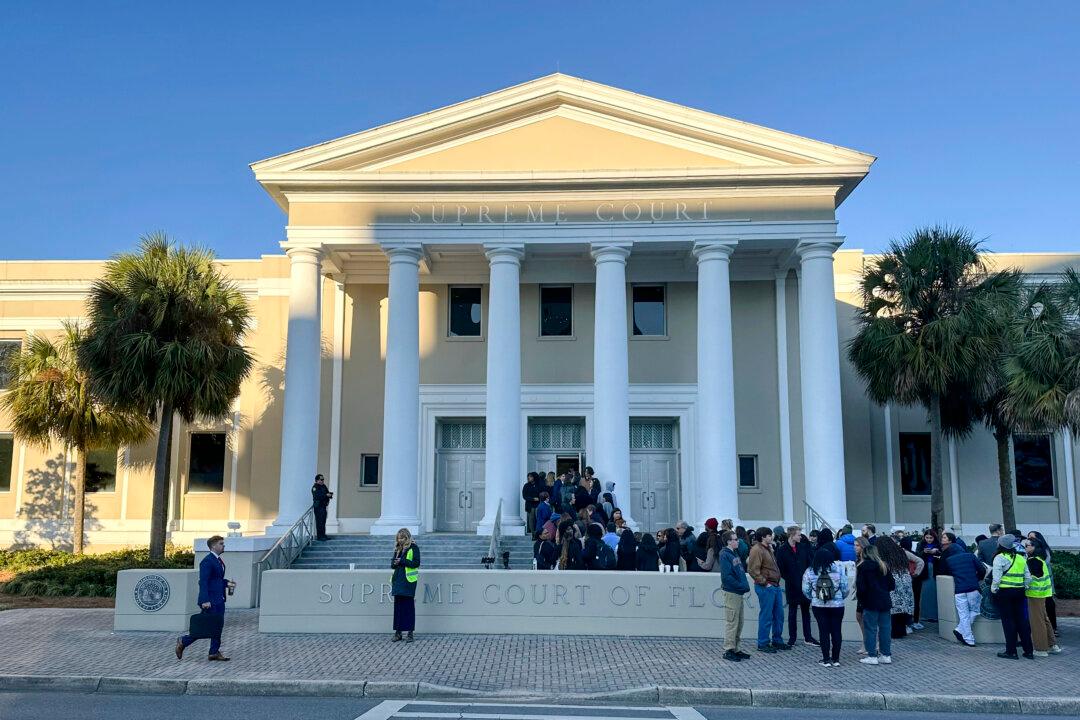Florida’s 6-week abortion ban having taken effect, state health officials are now detailing the limited set of medical exemptions to the contentious law.
On May 2, Florida’s Health Care Administration released a new rule that explains who is eligible for an abortion under the law and what the state defines as medical abortions.
The ruling clarifies the exemptions to Florida’s 6-week abortion ban—known as the Heartbeat Protection Act—that took effect on May 1, 30 days after the state Supreme Court upheld the 2022 15-week abortion ban. The court delayed the 6-week ban until issuing a decision on Planned Parenthood’s lawsuit against the 15-week law.
The May 2 ruling first clarifies the 6-week law, “a physician may not knowingly perform or induce a termination of pregnancy” if the fetus’s gestational age is more than six weeks unless the pregnancy meets certain criteria.
Those criteria include “preterm premature rupture of membranes (PPROM), ectopic pregnancy, and molar pregnancy,” which can occur after six weeks and “can present an immediate danger to the health, safety, and welfare of women and unborn children … if immediate and proper care and treatment is not rendered.”
If a physician induces the live birth of an unborn baby in any of these three scenarios, no matter its gestational age, the procedure “shall not be considered an abortion.”
Premature rupture of membranes describes a condition where the mother’s amniotic fluid breaks before she goes into labor, specifically before the 37th week of pregnancy.
A mother’s water breaks as she goes into labor, but the earlier this happens, the higher the risk for both her and the baby. This condition affects eight to 10 percent of all pregnancies.
In ectopic pregnancies, a fertilized egg grows outside the uterus’s main cavity instead of attaching to the lining. It sometimes occurs in the fallopian tube.
If this happens, the fertilized egg can’t survive, and the growing tissue could cause the mother to bleed to death without immediate medical intervention.
Molar pregnancy refers to a condition where an egg and sperm cell improperly join at the point of fertilization, which creates a noncancerous—or trophoblastic—tumor as the placenta attaches to the uterus.
The tumor prevents an embryo from developing and often causes a miscarriage. But if this does not happen naturally, medical intervention is necessary to prevent “serious complications.”
Florida’s Health Care Administration blasted the Biden administration and abortion access advocates for launching a “deeply dishonest scare campaign” that poses “an immediate danger” to pregnant women and babies in their efforts to criticize and highlight the limits posed by the 6-week abortion ban.
The agency said it issued the ruling to “safeguard against any immediate harm that could come to pregnant women due to disinformation” and to guide “licensed facilities to continue to administer life-saving procedures.”
Mr. DeSantis signed the 6-week ban into law in 2023 after signing the 15-week ban in 2022 following the U.S. Supreme Court’s historic Dobbs v. Jackson Women’s Health Organization decision that overturned Roe v. Wade. However, after Planned Parenthood sued the state over the 15-week law, the court prevented the 6-week ban from taking effect until April 1, when it ruled on the case.

The April 1 ruling that upheld the 15-week ban initiated a 30-day window for the 6-week ban to become law on May 1, which includes exceptions for rape and incest, along with human trafficking up to 15 weeks of pregnancy after conception.
Physicians are allowed to terminate a pregnancy to save the mother’s life or prevent “a serious risk of substantial and irreversible physical impairment.”
Pro-life advocates of the Heartbeat Protection Act argue that a baby’s heartbeat begins at six weeks and, therefore, marks a significant threshold in the development of an unborn child.
Abortion advocates opposing the law argue that many women do not know they are pregnant until after six weeks, making it difficult to lawfully administer an abortion outside of any medical emergency.
House Minority Leader Hakeem Jeffries (D-N.Y.) held a press conference in Broward County, Florida, after the April 1 court ruling that featured a Florida woman who claimed doctors forced her to carry to term a baby who had Potter’s syndrome.
A rare condition that prevents a fetus from developing kidneys, it results in the death of an infant within hours of birth. The woman claimed doctors refused to give her an abortion because there was no threat to her life and said the baby died shortly after birth.
Additionally, the Supreme Court heard arguments on April 24 regarding Idaho’s law that bans abortions except when a mother’s life is at risk. The case argued that Idaho violated federal laws that force doctors to give stabilizing treatment to patients in any healthcare emergency, even if it is an abortion.







